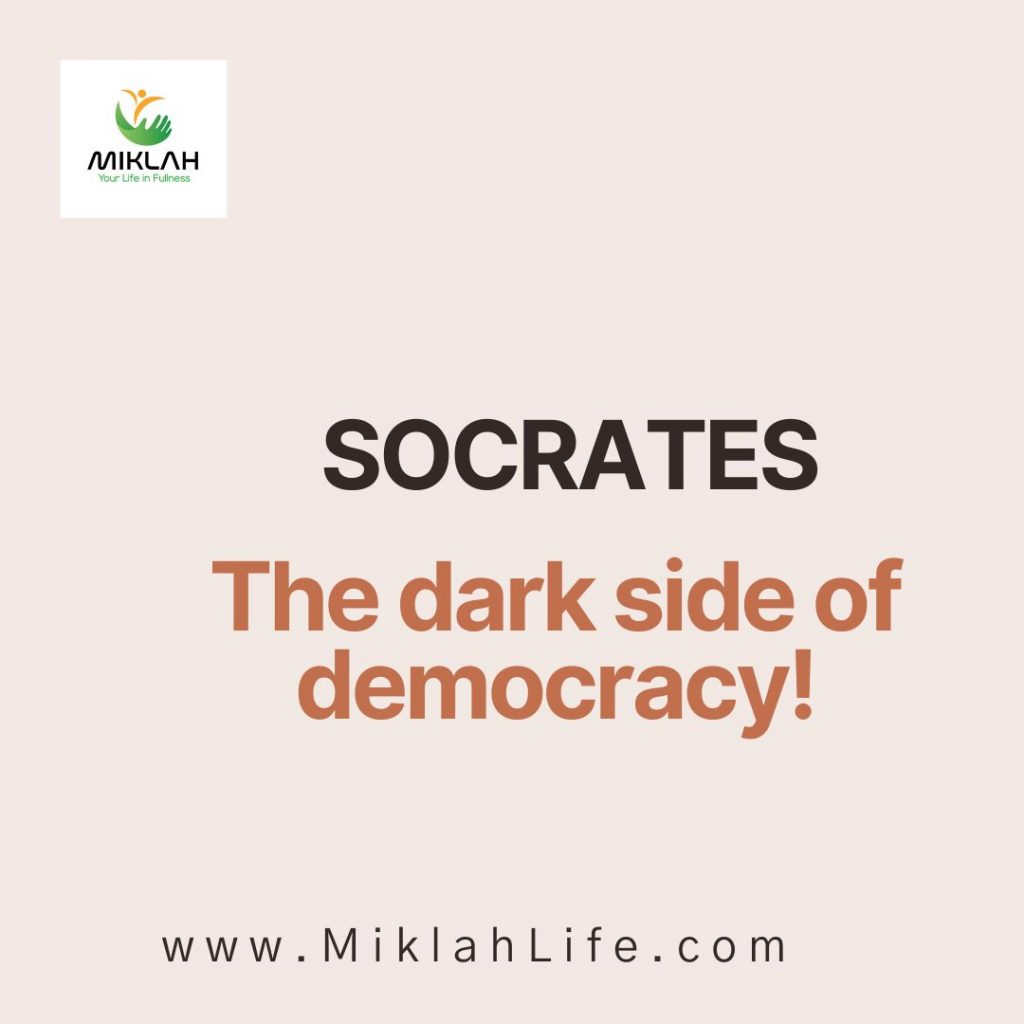Socrates on The Dark Side of Democracy: The Rule of the Majority Could Literally be The Rule by Fools!
Socrates is one of our three greatest philosophers from Athens, the others being Plato and Aristotle. In his philosophy, Socrates said that the greater happiness of a person or his soul comes when he does the greater good.
He, however, added that only few people can take time to do the greater good, for a big number of them are just directed by their fresh and self motives while denying the greater thirst of their souls. Thus, argued him, only a few people in the society can live their lives doing greater good and attain such great happiness.

Applying this to politics and leadership, according to World History Encyclopedia, Socrates was not a fun of democracy in its crude definition; the power of the majority over minority. In this case, Socrates reasoned, majority are often not good or have no wisdom. Socrates believed that leadership should be trusted in the hands of the few or those who are wise enough to make rational decisions for the society or a country.
In fact, to prove this point, Socrates himself was put to death by mere slim majority over minority in his death case. According to Scotty Hendricks, in his citation of Plato’s work, ‘a mere 30 votes, out of a jury of 500, killed him (Socrates).’ This is how evil democracy can be. The extra one fool can lead a nation to destruction! Somewhere else, I have ever argued that the minority can as well be right. And it is wise to always consider the minority’s take on every issue.
Read this: Seeing Truth Through the Minority
It is a common view among political analysts here in our country that the behaviors, the thoughts, the wisdom of the leaders or our president today are simply a reflection of what the society is. In other words, if our leaders have rotten souls that no longer pursue that ‘greater good’ for others and themselves, then it means that the society (the people who voted them into power) are probably the same. In others, fools vote their fellow fools into power.
According to Socrates, the public deserves no power to lead or determine leadership but few selected individuals should be leaders and guide their societies to development.
While I agree with Socrates’ observations, I now wonder how we can determine the wise people of our days so they are they are the ones to lead us!
Yeah, one of the great disadvantages is that power is put in hands of the masses, the masses that are in most cases non-educated (formally and informally), have no desire to serve their souls, whose lives are without vision and goals and who are unhappy. In the end, we (the ‘foolish’ masses) vote for people of our nature; the corrupt, murderers, the thieves, the atheists, and all sorts of evil as reflected in our leaders. That was Socrates explanations.
However, if few wise ones were to be selected, this time not by many people (democracy), which other means can we apply to really extract these ‘too good’ individuals?
Socrates on Democracy: Applying this in today’s world!
The writings about Socrates (by the way, Socrates did not write his philosophies) give us some insight though I am not sure that it is what Socrates would suggest. They say (see here and here) that one of the reasons that Socrates became the wisest of his times (also our times) was because he never called himself wise.
It is said that when Socrates passed around asking questions (syllogism approach), those who were famous wise men of his time failed the questions and yet kept showing off ‘wisdom and intelligence’ regarding what they actually didn’t know. In other words, they pretended to know when they didn’t know!
On the other hand, Socrates always admitted that he knew nothing. Westacott cites this: “I know very well that I possess no knowledge worth speaking”. This ended up making him the wisest for he admitted ignorance and understood the greater purpose of life from greater values and personal happiness than power, property or fame.
It is a common quote from him, “the greatest wisdom lies in knowing that you know nothing”. From this, we can deduct that the wisest of our times should be understood from their actions, relations with others and themselves and the general great values they stand for and not necessarily their pseudo knowledge and show off of expertise.
The fact that Socrates found out all of this through the questioning method is an inspiration in itself. Maybe the government would initiate a body to formulate a guideline or a body of questions that should assess the wisdom of the leaders!
Practice ‘truth through minority’
While the above may not entirely apply in our era where everybody seems to be elite, I think there is sense in it that we can draw into our usual democracy to perfect it to an extent.
Really, the guidelines that allow leaders to be part of our parliament here in Uganda are so low and this has led to a great number of leaders who are just ‘moving clouds’ (leaders who have no souls to defend, leaders who have childish and useless thoughts, leaders who have evil manners and behaviors, leaders who have a low reasoning capacity, and who really have let us down).
I think that there should be some kind of sieve to narrow down this big number of unwise leaders shouting in our parliaments, our local councils, presidency, army leaders and police and all other leadership posts. While the education level is also low as required, it is not enough even in it’s highest to be the determinant of those eligible for parliament.
Education level needed should be raised; some experience in leadership especially for MPs, mayors, heads of army, police, and government institutions, presidency and other important positions should be a requirement. Democracy (voting by many) can remain our first line in the ways of choosing these capable leaders, but there should be an additional layer or sieve through which these leaders should be voted or accepted to lead. Besides, enough information should be provided to our citizens before they do any voting.
The government should design some kind of screening procedure whereby elected leaders are questioned about their motives, deep values, their former duties and what happened there, their future goals and how they plan to achieve all of it. Failure to win over this screening, a leader should be pushed back. Yeah, Socrates idea is true even up to now. Few people know the great values to stand for and these should be entrusted with power to decide for our nations.
THE END
What do you think?

